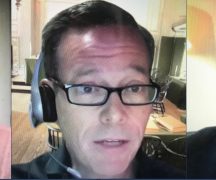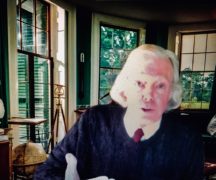By JAN LARSON McLAUGHLIN
BG Independent News
All across Wood County, “patriots” are being called to defend American principles they say are under siege.
Monthly meetings are being held at 11 locations to explain the 1776 Report, commissioned by former President Donald Trump, and recruit citizens to advance those principles.
Letters were sent out last week to Wood County citizens enlisting them to promote the patriotic history of the United States in their local school districts.
“Among the nations of the earth, none has raised more people out of poverty, given more charity to the poor, advanced human rights, defended the rights of conscience, naturalized more immigrants, and defended the cause of freedom than the United States of America,” Jonathan Jakubowski, founder of the 1776 Initiative in Wood County, wrote in his letter to local residents.
“It is no secret that our timeless American principles are under siege,” the letter stated, placing the blame on leftist “big tech, corporate America, higher education, big government, Hollywood, sports and the media.”
“One of the last frontiers for the Left are the school districts in the heartland of America,” Jakubowski wrote. “Topics like critical race theory and LGBTQ+ special interests are actively being deployed at the K-12 level throughout the country.”
So local residents are being asked to combat liberal principles and defend the history portrayed in the report completed by the 1776 Commission. The 1776 Report was Trump’s response to the “1619 Project,” a Pulitzer Prize-winning report by the New York Times published in 2019 – four centuries after the first slaves were brought to America.
Gathering in Bowling Green
Nearly 50 local residents – all white and most older adults – answered the call on Saturday to attend one of the first 1776 Initiative meetings in the county. When asked why they were there, many expressed concerns about a shift they see in the U.S. Schools are not teaching the positive history of the nation, parents are too lenient with their children, elections are not secure, and the media leans far to the left. Several hoped to learn how they could be more effective in defending the America they know and love.
The meeting began with a welcome by Lance Wood, one of the facilitators for the project. He explained his reasons for getting involved.
“We need to go back to the roots of what the Constitution actually says,” Wood said. “Our nation was founded on giving all of us freedoms. It’s one of the most inclusive documents written in the world. That document was written for every American citizen.”
Wood asked those attending to explain their motivation for attending.
“I’m alarmed by the election and our freedom,” one man said. “If you don’t have a free election, you don’t have freedom.”
“We know the last one was as crooked as the day is long,” he said. None of the coordinators of the 1776 Initiative present defended the legitimacy of the November election.
The man continued, expressing his concern about the wrong curriculum being taught in schools, and about parents not being able to discipline their children properly because of involvement by Children’s Services.
“It’s a gestapo type situation,” he said about parents being reported because of how they discipline their children.
One woman asked if the 1619 project curriculum is being taught in schools.
“I’m really concerned what they are trying to teach,” she said, noting that students are being told “if they are white, they are the problem.”
It was not mentioned at the meeting, but no Wood County schools are teaching the 1619 curriculum.
Several mentioned the founding fathers’ belief in God that has led to a strong nation.
“That’s why our country is the best country to live in in the world,” one man said.
“We need to take our country back. It’s being overrun by evilness,” one woman said.
But one man at the meeting, Norm Heineman, expressed different motivation for attending on Saturday. He asked how many at the meeting had read the 1619 Project – which prompted the creation of the 1776 Report. A couple hands were raised.
“It’s horrible,” one woman in the audience said.
But Heineman instead spoke of the inaccuracies in the 1776 Report.
“One of the reasons I’m here is to correct the misconception” that the Declaration of Independence truly considered all men as created equal.
“That’s just not true,” said Heineman. Those given “equal” status were white, Christian males of Northern European descent, who owned property.
“Everybody else had to fight for that right,” he said. “It did not include anybody else.”
While several attending the meeting were concerned about the legitimacy of the last election, Heineman said he was troubled by many efforts underway to restrict voting.
“That’s as un-American as can be,” he said. Those efforts to limit voting are being conducted “under the guise of security of elections,” when there has been no proof of voting fraud.
“Everybody’s entitled to your own opinion, but you’re not entitled to your own facts,” Heineman said.
Several people at the meeting were searching for ways to defend their country against negative attacks.
“Every day I hear objections about our country. They are not describing the country I know,” one woman said.
“I’m looking to interact with people who love our country,” one man said. “I’m deeply disturbed. I keep asking myself – is somebody going to do something?”
Another woman defended the Constitution as being inclusive when it was first written. Amendments were needed later just to clarify those freedoms, she said.
One man talked about the need to find good sources of information. After years of watching news on TV, he now gets his news on social media.
“I will not invite the communist party in my home ever again,” he said of TV news.
Bowling Green City Councilman Greg Robinette talked about the differences he observed in the education of his children, whose ages range from 16 to 30.
“I’ve seen the change in the way education of our country is evolving,” he said.
But Robinette said efforts like the 1776 Initiative offer hope.
“We haven’t lost our country yet,” he said. “But we could.”
Robinette referred to the “false history coming out of the media” and “anti-American sentiment from the press.”
Jakubowski said he heard many people express their frustration after the last election. He encouraged those at the meeting to not give up hope.
“We have a lot of influence in our backyard,” he said.
Jakubowski explained that the 1776 Initiative is not out to modify election results, not a political strategy and not a hate group.
“We are here to educate you,” he said. “We’ve got to understand what the foundation of America truly is.”
Jakubowski acknowledged that the U.S. isn’t perfect.
“Slavery is the greatest stain on our history,” he said.
After the meeting, Jakubowski said the 1776 Report does not whitewash the history of slavery in the U.S. He objected to the Ohio Department of Education listing the 1619 Project as a resource for teachers, saying it is a threat to education.
Voices of dissent
Many argue that the true “patriotic” history of a great nation does not insist on focusing just on positives. An honest examination of the nation’s beginnings shows that the founders talked about equality – but many of their actions betrayed that goal.
Many historical experts have emphasized that the 1776 Report, published by a group of conservative political operatives and academics, contains false assertions intended to distort well-documented accounts about how discrimination was enshrined by the nation’s founders and continues to persist in various forms, hundreds of years later.
Among the many sections called out for whitewashing historical narratives, the 1776 Report claims there’s no truth to statements that the Founding Fathers were hypocritical for upholding slavery while claiming that all men are created equal.
Dr. Andy Schocket, who teaches history focusing on the American Revolution period at Bowling Green State University, said history is often viewed through multiple lenses. Some see it as open to continual reinterpretations as time changes. Others see history such as the founding of the U.S. as “this glorious, possibly divinely inspired event.”
The 1776 Report appears to view American history as the latter, Schocket said.
As an historian, Schocket appreciates efforts to learn about the beginnings of the U.S.
“I always think it’s great when people are interested in history,” he said. “But I also am disturbed by an interest that appears to be a desire to push a position.” That desire can ignore the complex history of the U.S. and result in patriotism morphing into nationalism, he said.
As for the 1619 Project being on the list of resources for Ohio educators, Schocket said the information offers defensible historical interpretations from history scholars.
“I don’t find that objectionable,” he said.
Schocket also pointed out that the New York Times took the “responsible” path and changed a part of the 1619 Project that originally argued that Americans revolted against Great Britain in order to maintain slavery. While that appears to have been the motivation for some, it was not the primary cause of the revolution, he said.
Schocket said efforts like that of the 1776 Commission have occurred throughout history. The most recent was the effort by the hyper conservative Tea Party to present its brand of history.
As a Black man in America, Anthony King sees the 1776 Initiative as a threat.
“I think it’s a disgrace,” said King, who is founder of the Black Rights Activism, Visibility and Equity (BRAVE) organization in Bowling Green.
The report ignores the impact of slavery on Americans’ lives and the lingering financial and social effects it still has today, he said.
“It’s not the right approach to history because it wipes out the true history,” King said. “We are going to do anything in our power to make sure this never enters our schools.”
King would like to see community conversations held on the differences between the 1619 Project and the 1776 Report.
“We should empower the community to counteract these racist acts,” he said. “I do encourage the community to denounce this.”




